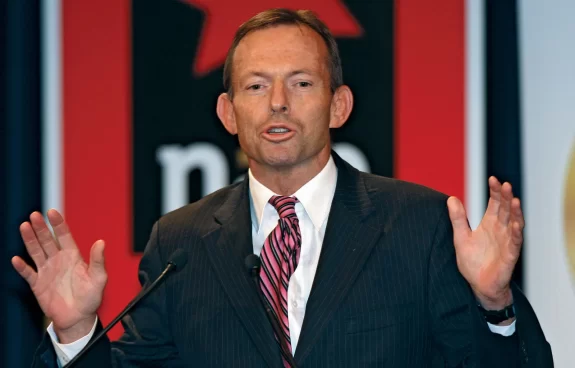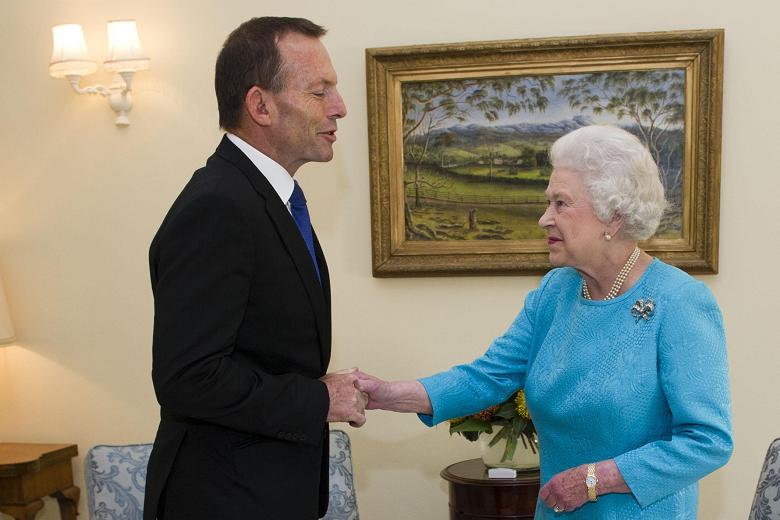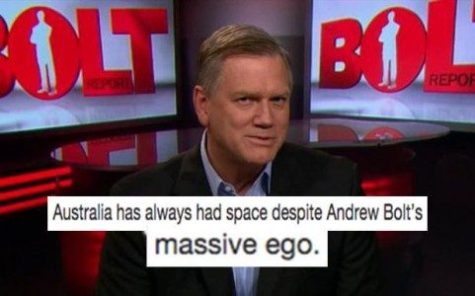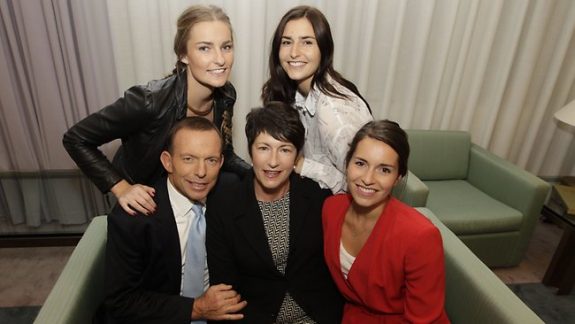What’s there to crow about?

Tony Abbott is gleefully crowing about “100+ days without a boat”. What Mr Abbott seems oblivious to is that he has closed yet another door on people fleeing persecution and human rights abuses in places like Myanmar and Sri Lanka. The Taliban just fired rockets at the Electoral Office in Afghanistan so the upcoming election doesn’t look like it will make everything tickety poo over there either. Things don’t seem to be getting any better in Syria though the government haven’t done any mass gassings lately, not in the open anyway.
And it isn’t as if we have increased our humanitarian intake or processed any of the people already being illegally held in detention. This has cost us a fortune, subjected our navy to allegations of abuse, seen us internationally condemned, caused enormous mental and physical harm to vulnerable people, and Australian guards are now implicated in the death of a man who was under their protection. Yet this is supposed to be a success?
Tony’s team are also pushing very hard for the repeal of the carbon tax but it is becoming harder and harder to drown out the chorus of condemnation for such an act from world leaders, the UN, climate change bodies, scientists, economists and the citizens of the world. He accused the executive secretary of the UN Framework Convention on Climate Change, Christiana Figueres, of “talking through her hat”, and said he doesn’t want to “clutter up” the G20 agenda with talk about climate change. Can you imagine how that was received?
Blatantly sacking scientists and advisory bodies to appoint climate change deniers to every position might allow you to fool people in Australia in the very short term. It will not change the science. This headless chicken (Prince Charles) flat earth (Barak Obama) denial is wasting precious time and shows us globally as unwilling to do our bit – something Australians have always been respected for in the past.
The Senate inquiry into the Direct Action Plan has released its findings and they are damning. If this process is to have any credibility, the Coalition must drop this idea and agree to move to an ETS with higher targets for emission reduction and renewable energy. It is what every expert recommends, especially the economists.
Greg Hunt must be the only Minister for the Environment who would be bragging about approving billions of dollars of new coal mining and port expansion which will unquestionably lead to the degradation of one of the world’s greatest natural wonders. He has also advocated the removal of marine park legislation to allow for commercial fishing, removal of world heritage listing to allow for logging, and the building of dams in our ecologically sensitive pristine North. With an Environment Minister like that, who needs natural disasters?
And then there is the mining tax. On the 7:30 report, Abbott claimed that the mining and carbon taxes were partly to blame for BHP Billiton’s decision to delay the expansion of its huge Olympic Dam mine despite the fact that Marius Kloppers said it had nothing to do with the mining tax which doesn’t even apply to the copper, uranium or gold extracted from the site.
Mining profits worldwide have slumped by half since 2011 as the mining boom comes off its highs according to a report by PriceWaterhouseCoopers which says that higher costs, more writedowns and fluctuating commodity prices have hit the fortunes of the top 40 mining companies including BHP Billiton and Rio Tinto.
PwC Australia’s head of energy and mining, Jock O’Callaghan, says the possible repeal of the mining tax in Australia is unlikely to have much impact on Australia’s appeal to investors. Not surprisingly, the government has failed to take note of this advice.
Mr O’Callaghan says he expects more mines to close, including in Australia. “Certainly if we see a further downturn in commodity prices that is going to put more pressure on marginal mines,” he said. “There is no denying that and again that is not just an Australian phenomena.”
As Ross Gittins explains,
“For the income earned by an industry to generate jobs in Australia, it has to be spent in Australia. And our mining industry is about 80 per cent foreign-owned. For our economy and our workers to benefit adequately from the exploitation of our natural endowment by mainly foreign companies, our government has to ensure it gets a fair whack of the economic rents those foreigners generate.
Because Labor so foolishly allowed the big three foreign miners to redesign the tax, they chose to get all their deductions up-front. Once those deductions are used up, the tax will become a big earner. Long before then, however, Tony Abbott will have rewarded the Liberal Party’s foreign donors by abolishing the tax.
This will be an act of major fiscal vandalism, of little or no benefit to the economy and at great cost to job creation.”
Mining currently employs about 2.4% of our workforce but this is set to drop as they move into the less labour-intensive production phase. As we saw during the GFC, they are not altruistic benefactors and have little loyalty to their employees. According to Richard Denniss
“When commodity prices fell during the global financial crisis the first thing the mining industry did was sack thousands of their workers. Indeed, according to Treasury, if all industries had been as quick to punt their employees as the mining industry the unemployment rate would have hit 19 per cent rather than its peak of 5.9 per cent.”
Penny Wong described Abbott’s rhetoric regarding the mining tax as “one of the most dishonest, self-interested fear campaigns that we have seen in Australian politics” and I can only agree.
After saying there was no difference between Liberal and Labor on education, we have seen billions cut with a backing away from the bulk of the Gonski funding, the abolition of trades training centres, and cuts to the before and after school care program despite childcare being identified as far more important in improving productivity and workforce participation than paid parental leave.
We have also seen the Coalition attempt to repeal Section 18c of the Racial Discrimination Act in a bizarre attempt to “protect the rights of bigots”. Countless journalists have said they have not felt constrained in any way by this section of the act and do not see the need for its repeal. This is purely and simply a pander to Andrew Bolt and Rupert Murdoch. Promoting hatred under the name of free speech is a truly cynical exercise which has left many Australians feeling very uneasy about what is happening to our country.
According to the Coalition, our debt and deficit are a real problem and spending must be reined in. While listening to a relentless barrage softening us up for the cuts that are to come, we watch Tony Abbott spend money hand over fist on his Paid Parental Leave scheme, orange life rafts, unmanned drones, planes both for the Air Force and himself, grants to polluters, gambling on the foreign exchange market, tax concessions for the wealthy, subsidies to profitable mining companies, marriage guidance counselling vouchers, and gifts to pollie pedal sponsors.
We are also going to sell everything we own and spend billions to build roads. Public transport and high-speed rail will receive no funding. I am sure the fact that cars rely on fossil fuels hasn’t entered into the decision making.
With the rollout of the NBN in limbo, Malcolm Turnbull has admitted that he cannot keep his pre-election promises. His inferior offering will take much longer and cost much more than he led us to believe and will be outdated before it is even completed.
Abbott’s rush to sign free trade agreements which include ISDS clauses with all and sundry (No. 87 on the IPA’s wish list), has put our nation at sovereign risk where we will risk being sued if we introduce laws to protect our health and environment. It will almost certainly lead to a huge increase in the cost of medicine as pharmaceutical companies block the release of generic medicines, and a host of other repercussions that we can only anticipate with dread.
We have the Social Services Minister, Kevin Andrews, winding back gambling reforms and disbanding the oversight of charitable bodies. We have the Environment Minister disbanding climate change advisory bodies and removing environmental protection laws. We have the Health Minister disbanding bodies like the Australian National Preventative Health Agency, the Advisory Panel on Positive Ageing, the Alcohol and Other Drugs Council of Australia, and attacking Medicare with offices closed on Saturdays and co-payments likely. We have the Assistant Health Minister blocking a healthy eating website and the Assistant Education Minister asking childcare workers to give back their pay rise. In fact, I cannot think of one act or one piece of proposed legislation that has been in the best interest of the people of Australia.
With cuts to foreign aid, indigenous affairs, charities, and asylum seeker advocacy groups, it is increasingly obvious that the vulnerable can expect no protection or assistance from this government. They have made their agenda patently clear. Buy a ticket on the Good Ship Rinehart and lift with the rising tide, or be left to drown as the wealthy stand on the shoulders of the poor to board the corporate gravy train.
Like what we do at The AIMN?
You’ll like it even more knowing that your donation will help us to keep up the good fight.
Chuck in a few bucks and see just how far it goes!
Your contribution to help with the running costs of this site will be gratefully accepted.
You can donate through PayPal or credit card via the button below, or donate via bank transfer: BSB: 062500; A/c no: 10495969














